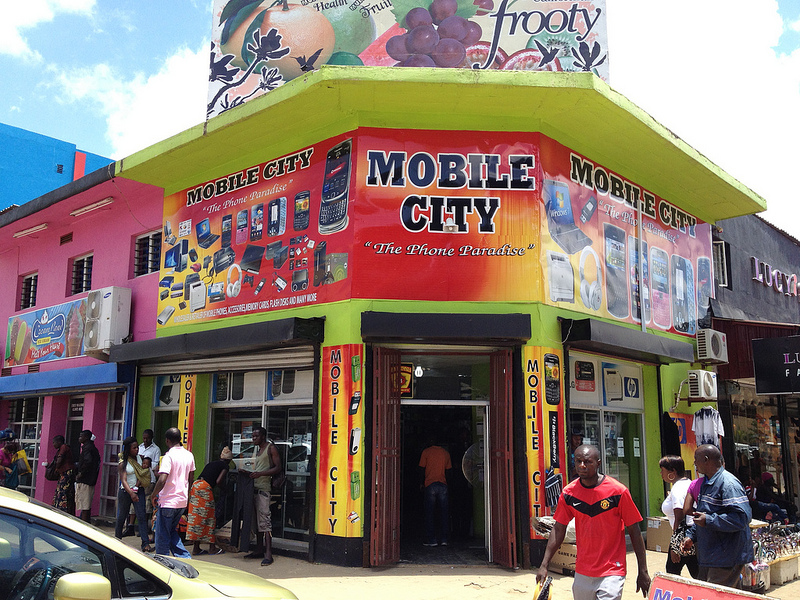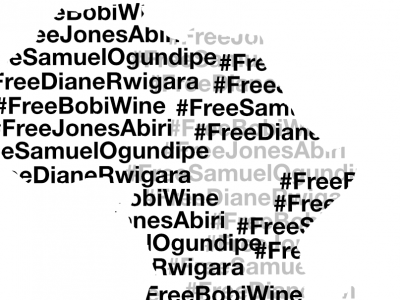
Mobile phone shop in Lusaka. Photo by Curious Lee (CC BY-NC-SA 2.0)
The SIM cards of over two million Zambian mobile phone users were deactivated last week, according to the Zambia Information and Communication Technology Authority. After spending several months pushing subscribers to register their SIMs, the regulatory body now says that those who did not meet the January 31 deadline have had their SIMs deactivated.
Most people in Zambia, a country with a population of just over 13 million, own up to three SIM cards, one for each telecommunications service provider. Zambians also use them to access mobile Internet services.
In a statement released shortly after the close of registration ZICTA announced that out of a subscriber base of 9,462,504, “a total number of 8,235,991 SIM cards have been registered while 2,215,376 have been deactivated.”
Apart from cutting off services to subscribers who failed to register their cards, ZICTA also threatened to punish any of the three mobile phone service providers MTN, CellZ and Airtel in the same statement, stating:
As is the case in any process of this magnitude [SIM card registration], some level of margin of error is expected and accepted. Any Service provider found to have mistakes within the margin of error will be requested to re-run their system. However, for any Service Provider whose errors shall be above the accepted threshold will be punished by Law.
The SIM registration process did not go over without problems. Some people who had registered at the beginning of the exercise, four months prior to the deadline, discovered last month that they were not on the final list of registered subscribers. Others had their numbers under different names and even the wrong gender.
Former Vice President Brigadier-General Godfrey Miyanda, a leader of the now-opposition Heritage Party and a vocal critic of SIM registration policy, had one of his SIM cards registered without his knowledge. The phone company later apologised.
Gen. Miyanda is among some subscribers who have threatened to take ZICTA to court for allegedly threatening their rights and freedoms pertaining to privacy, property ownership and communication. On the last day of registration, Gen. Miyanda, in what he referred to as his last post, wrote:
Fellow internet partners and the Social Media family, I wish to inform you that the Zambia Information and Communication Technology Authority (ZICTA) have reminded me that by midnight this day they will cut me off from civilisation by arbitrarily deactivating my SIM cards without just cause. I have NOT committed any crime, neither is there a credible record of the prevalence and/or abuse of these communications gadgets to justify any derogation from the said guaranteed rights.
Gen Miyanda, who had written several statements on this issue, continued:
By this single act ZICTA is attaching the condition that before I can enjoy my guaranteed freedom of expression I should first apply to the Authority or their agents to be registered. By the same token ZICTA are infringing my right to privacy and other proprietary [rights]. I contend that these freedoms and liberties cannot be taken away arbitrarily or traded for a few minutes of airtime. My communications to ZICTA and the Mobile Service Providers have remained unanswered. This means that by midnight I shall not be able to communicate or use my purchased implements for such communication. In short until this issue is resolved I shall be off air, including off the internet. This is my Last Post for now.
A journalist and mobile phone subscriber who has threatened class action against ZICTA complained that local media had not covered his anti-SIM card registration fight. Kasebamashila Kaseba alleged that the media was compromised by the regulatory body which sponsored various media activities including awards and working breakfasts. He stated:
As we close and review the public and media debates, to open the court process, in view of ZICTA deadline of Friday, 31st January, 2014 for SIM card deactivation, I wish to say and may elaborate later that we may not seek an “injunction” or “judicial review” as the matter is outside the law or SI 65 of 2011. Instead, the “class action” as already mentioned elsewhere may include action against some public media houses that benefited from the ZICTA SIM card registration […] campaign of deactivation and may include “citizen’s arrest.”




3 comments